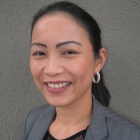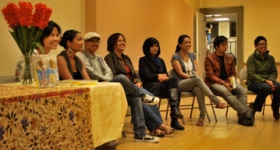If Betty Chung’s mom were still alive, I’d have liked to see her give a good lecturing to Tiger Mom. But I guess I’d just have to content myself with the ways that Betty Jamie Chung’s Life Recipes from My Mother made me thankful. Thankful because its lessons stressed being good rather than looking good on paper, being ethical rather than righteous, and competing against oneself rather than winning out over everyone else. But most of all, Chung’s book made me thankful because it reminded me of the kind of mom I’d like to be someday.
Chung’s mother Tao Xian died in 1978 in Hong Kong after fleeing mainland China during the Japanese invasion. Although her sickly constitution progressively weakened her throughout her life, she overcame many limitations placed upon women by her historical milieu. Unlike most women of her time, Tao Xian attended formal schooling and finished college. She worked as a librarian and English translator, translating the likes of Plato and other Western canonical writers. During the Japanese invasion of China, she led an organization that cared for war orphans. She then worked as an editor for a magazine devoted to the women’s movement, and was elected an official of the Cantonese National Assembly.
Recipes is divided into three main sections: Recipes for the Soul, Recipes for Successful Relationships, and Recipes for Agreeable Living. Each section is separated by photographs, which are quite lovely to look at (I wish they had captions, though) and prove Chung’s oft-repeated assertion of her mother’s singular beauty. While most of the lessons in the book, ranging from etiquette to ethics (i.e., have good table manners, choose to be right rather than popular, keep your mouth shut about other people’s business, etc.), are commonly known and unsurprising, they still serve as a good refresher course.
Each chapter follows a repeating structure: a new lesson is introduced, a personal anecdote of the author’s struggle against the lesson is shared, and finally, the lesson is vindicated and accepted. At times the formulaic quality of the chapters felt tiresome or monotonous, but Chung’s vivid remembrances of her experiences and her mother’s sage words often rescued the work from being completely abandoned by this reader.
There were moments when Recipes astonished with pretty progressive and modern advice. Perhaps the most contentious of these is Tao Xian’s rejection of the myth of the have-it-all woman: “Modern women have to recognise that they cannot have and be everything -- career woman, wife, mother, and daughter all rolled into one person. They have to trade off -- which to focus on, which to excel in, and which to treat as secondary.” I’m sure many would still jump at the chance to disprove such wisdom, even if the insistence that women can bring home the bacon and fry it too (or at least try their best to overextend themselves to do so) creates unfairly exaggerated, even oppressive expectations of women. Another surprising piece of advice is Tao Xian’s rejection of Chinese filial piety in its most traditional sense: “Respect, but do not always obey.” I wonder how many of us American-reared children would still have parents choking at that.
My main critique of the book is how Chung over-idealizes her mother. The book would have felt more well-rounded and honest had the author spoken about mother’s shortcomings in addition to her lessons. Sharing such information would have imparted a sense of truer wisdom gained through personal mistakes rather than what seemed at times pithy lessons. Sometimes, the adoring descriptions of her perfect-seeming mother were too much and made me want to roll my eyes (for example, the author reports that when her father first saw her mother, he described her “pure, unworldly, untouched, almost ‘angelic’ face" as "the face of a nun”).
Overall, though, I found Recipes to be instructive and inspirational. This book will be an accessible and comforting read for anyone as it is written in a conversational style of writing, unlike the sassy or quasi-bitchy tone that is the fashion for advice books these days. Chung’s mother does not come across like some self-righteous preacher-dictator, but as a very dignified woman, understated yet firm. This guide might just be the antidote against the budding Tiger Moms among us.










Comments